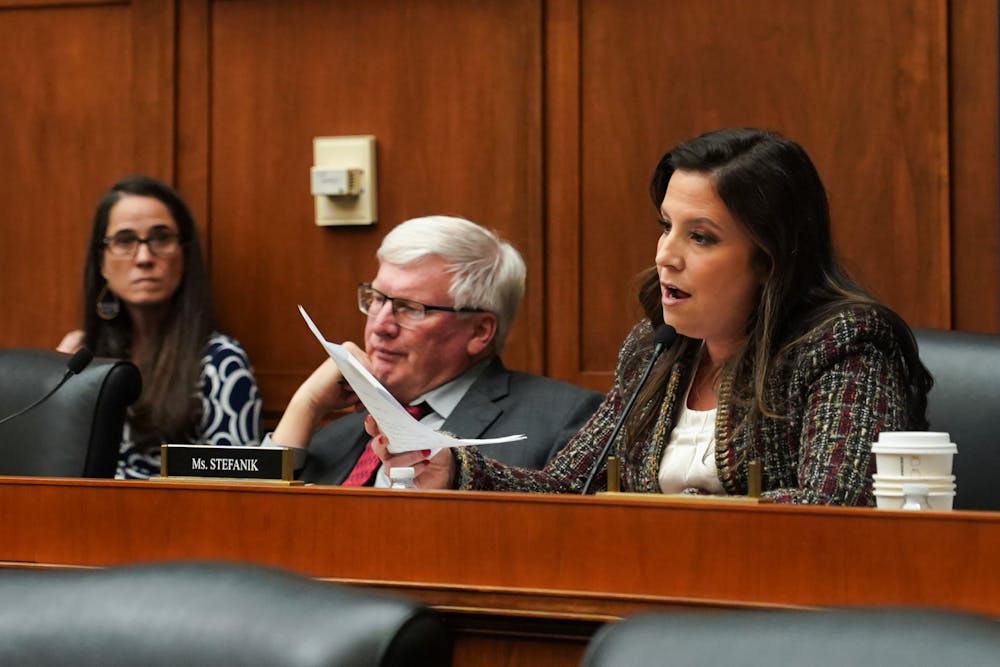Penn President Liz Magill received substantial criticism for her interaction with Rep. Elise Stefanik (R-N.Y.) during Tuesday’s congressional hearings — days before she announced her resignation on Dec. 9.
During the hearing, Stefanik repeatedly asked Magill — and Harvard University President Claudine Gay and Massachusetts Institute of Technology President Sally Kornbluth — if a call for the genocide of Jewish people would violate Penn’s policies or code of conduct. Stefanik referenced calls for "Intifada revolution" among some protesters on campus as calls for genocide.
Magill originally responded that “if the speech turns into conduct, it can be harassment.”
In response to Stefanik’s repeated questioning, Magill stated that a call for the genocide of Jews is harassment “if it is directed, and severe, pervasive.” Magill later added that it is “a context-dependent decision.”
Stefanik continued probing in response to Magill’s remarks.
“This is the easiest question to answer. ‘Yes,’ Ms. Magill,” Stefanik said. “Conduct meaning committing the act of genocide? … This is unacceptable, Ms. Magill.”
Magill concluded the interaction by reiterating that calling for the genocide of Jews “can be harassment.”
Magill has experienced harsh criticism for her statements from public officials and Penn community members, including from Pennsylvania Gov. Josh Shapiro, who told reporters that Magill’s comments at the hearing were “absolutely shameful.” A letter signed by 74 United States representatives also demanded the removal of the Penn, Harvard University, and the Massachusetts Institute of Technology presidents.
Gay and Kornbluth have similarly faced criticism for their responses to similar questions from Stefanik.
The exchange between Stefanik and the three university presidents has garnered national media attention, prompting White House Press Secretary Karine Jean-Pierre to clarify that “We do not stand for genocide. That is unacceptable,” but stopped short of calling for Magill’s resignation, adding that the White House does not “get involved in private university processes and how they run their university.”
In an email to the Penn Hillel community, Rabbi and Executive Director of Hillel Gabe Greenberg and Hillel co-presidents and College juniors Lauren Krasilovsky and Olivia Domansky also criticized Magill's statement.
“Throughout the hearing, Magill and the other college presidents sought to delineate their support for free speech, no matter how objectionable, so long as it does not turn into violence,” the email said.
In a video released on Wednesday evening, Magill expressed regret for her statements during the interaction and pledged to evaluate Penn's policies regarding hate on campus.
“In that moment, I was focused on our University's long standing policies aligned with the U.S. Constitution, which say that speech alone is not punishable,” Magill said. “I was not focused on, but I should have been, the irrefutable fact that a call for genocide of Jewish people is a call for some of the most terrible violence human beings can perpetrate. It is intentionally meant to terrify a people who have been subjected to pogroms and hatred for centuries and were the victims of mass genocide in the Holocaust.”
The University's "Free Speech FAQs" detail Penn's guidelines governing hate speech. These rules state that speech can only be disciplined by the University if "the inflammatory speech intentionally and effectively provokes a crowd to immediately carry out violent and unlawful action."
"Universities can invest their efforts and resources in educating their members and in creating spaces and contexts for productive dialogue, but they cannot legitimately punish members — students, staff, and faculty — who choose not to participate in those, or who profess bigoted and other hateful views," Penn's policy reads. "This is especially true in open and public spaces, like Locust Walk."
Magill also indicated at the time that she and Provost John L. Jackson Jr. would initiate a process to examine University policy regarding free speech.
“In today's world, where we are seeing signs of hate proliferating across our campus, in our world in a way not seen in years, these policies need to be clarified and evaluated,” she added.
In an interview with The Harvard Crimson, Harvard President Claudine Gay apologized for her similar responses to Magill.
“I got caught up in what had become at that point, an extended, combative exchange about policies and procedures,” Gay said in the interview. “What I should have had the presence of mind to do in that moment was return to my guiding truth, which is that calls for violence against our Jewish community — threats to our Jewish students — have no place at Harvard, and will never go unchallenged.”









